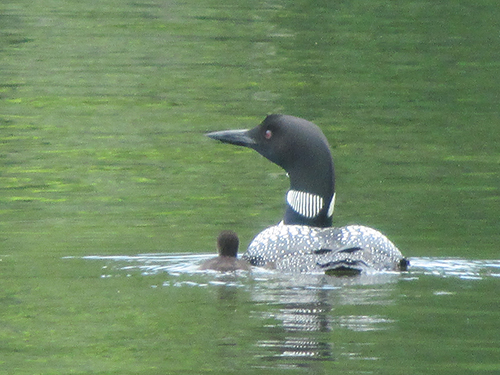
At daybreak on July 10, one baby loon hatched on Highland Lake after 28 days of incubating. Both parents were there to greet him or her.
By 4 o’clock that afternoon, the three ventured out across the lake to the “nursery” – a quiet area on the northern end of the lake. The little one swam on its own between its parents and when tired would climb on the back of a parent and take a ride. This is its floating nest for the next month.
The Agoos have a perfect view of the loon family for the next week or more, until the parents feel comfortable enough to take their new baby out and around the lake.
Peter Agoos reported the following on Day 2: “Busy breakfast scene this morning: two herons, an osprey, and the loon couple with their hitchhiker. Watched the fishing parent pass tidbits to the chick several times. On the third or fourth pass, the chick got so excited that it popped off into the water – seemed right at home – and after getting its bite, the carrying parent lifted a wing and it scrambled back up. They look pretty content.”
Now that the loons are off their nest, the island is open for its usual use of picnicking.
People have been asking me why there aren’t two babies, as loons usually lay two eggs. I found the second egg under the water near the nest site after the loons had left. Nests being washed away by wave activity is one of the most common reasons for egg failure. The egg is collected by the New Hampshire Loon Preservation Committee (NHLPC) for study.
For the next several months and until the lake is about to freeze over, the loon family will be seen feeding all around the lake. The baby loon cannot dive well enough to protect itself from motor boats, so be extra careful when motoring around the lake.
Loon watchers best stay at least 100 feet away from the loons. The NHLPC suggests 150 feet. A good pair of binoculars is the best way to watch, and there will be much to see!
We are blessed to have loons on our lake, and having a successful chick this year is extra special. Thanks to all who helped, and to everyone for keeping watch in their best interest.